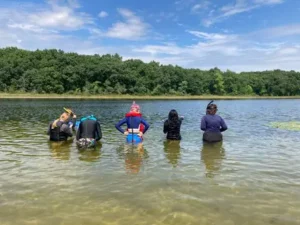Our October News to Us is here with spooky news on what’s haunting Michigan waters: climate change, invasive species, polluters, and even freshwater jellyfish! Oh my! But no need to fear, HRWC is here with a selection of stories to keep you up-to-date on the latest water and Huron River news. Peek below to see what lies beneath the headlines! 👻🎃
Polluter pay bills aim to give Michigan regulators more authority, tools for environmental cleanup
This fall, state legislators are looking to reinstate polluter pay regulations in Michigan. These laws ensure that responsibility for environmental cleanups and the associated costs fall on the polluting entity rather than Michigan taxpayers. Michigan’s previous polluter pay programs were eliminated in 1995, which reduced accountability from polluting companies and left residents vulnerable to environmental contaminants. The package of polluter pay bills are championed by Representatives Jason Morgan and Jeff Irwin, who represent Huron River watershed communities. HRWC supports the bills. We participated in a press conference at the Michigan State Capitol on October 25, 2023, sharing a map of contaminated sites in the watershed. Get a rundown of the bills and map from HRWC here. Click here for more of HRWC’s take on polluter pay legislation. And read more recent coverage by Bridge Magazine on the bills’ unveiling.

In warming Great Lakes, climate triage means some cold waters won’t be saved
As air temperatures increase due to climate change, the Great Lakes region’s cold water lakes and rivers are being pushed to a breaking point. As a result, many cold-water habitats are likely to be lost, and cold-water fish species like trout and salmon will be threatened. Research by the Michigan Department of Natural Resources indicates many of Michigan’s lakes and rivers are already nearing a threshold, especially those in the southern part of the state like the Huron River. Changing temperatures are influencing management decisions. For example, MDNR recently stopped stocking rainbow trout in Halfmoon Lake in our watershed due to warming water temperatures. 🎥 This article from Bridge Michigan also includes a microdocumentary on the impacts of our changing climate on Michigan’s fish species. 🎥
Jellyfish sightings in Michigan waters? Yes, it’s a thing
In 1933, freshwater jellyfish were first discovered in the Huron River by a high schooler fishing near Ann Arbor. These tiny non-native creatures have since spread across the Great Lakes basin but there continues to be a lack of scientific literature on freshwater jellies. Professor Cara Shillington and her students at Eastern Michigan University are trying to change that by advancing field research across the Huron River watershed in search of the elusive freshwater jellyfish. 🔊 In addition to the article linked above, check out a recent episode on freshwater jellyfish in the Huron River from Interlochen Public Radio’s Points North podcast below. 🔊
First Michigan detection of invasive hydrilla triggers response
Once of the world’s most invasive aquatic plants — hydrilla — has made its way into Michigan waters. The discovery of hydrilla near Berrien Springs, Michigan in early October triggered immediate response by the Michigan Department of Environment, Great Lakes, and Energy (EGLE) across Southeast Michigan and the St. Joseph River watershed. Hydrilla first made its way to the United States waters in the 1950s in Florida then spread across the east coast and the Great Lakes region over the following decades. Become familiar with how to identify and report hydrilla by visiting EGLE’s website.
Judge grants temporary order stopping operations at Ann Arbor-area mine
Operations at a Mid Michigan Materials gravel mine in the Fleming Creekshed just north of Ann Arbor have ceased due to violations of township ordinances and state environmental permits. Nearby residents have witnessed over 10 drinking water wells run dry over the past year, raising concerns about the mine’s operations and impacts on water quantity and quality. In a late October hearing, a Washtenaw County judge will reevaluate whether the mining operators are willing to comply with local permits and if operations can resume.



